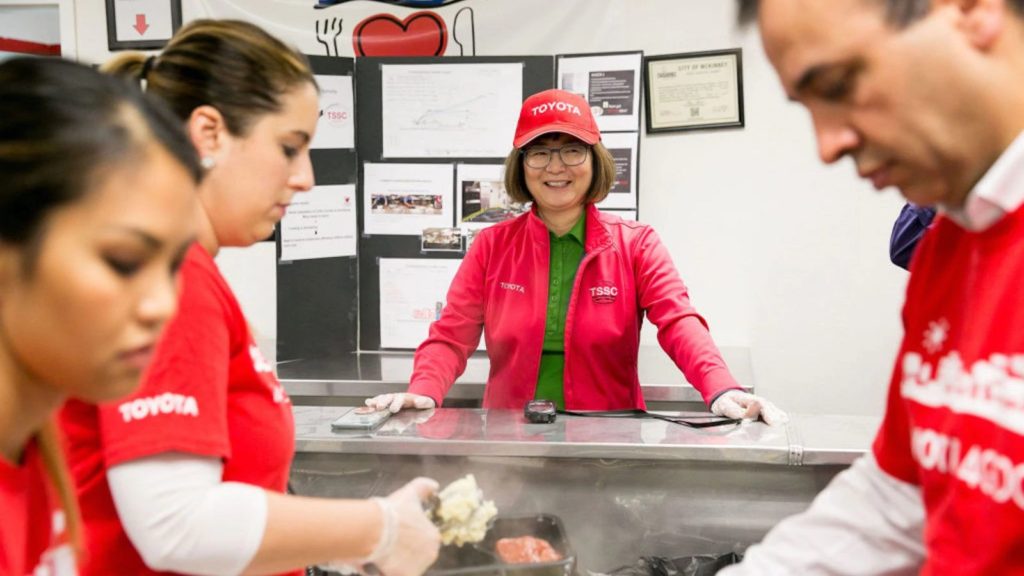Toyota shares its ‘secret sauce’ to help D-FW nonprofits do more
Apr 3, 2020

By Sabrina Corsiga
10:00 AM on Aug 30, 2019
Deep inside Toyota’s North American headquarters in Plano, there is a small group of dedicated professionals with a specific set of skills. Their sole purpose? To share Toyota’s “secret sauce” with society.
This 16-person team, called the Toyota Production System Support Center (TSSC), shares Toyota’s culture of empowering employees to be highly engaged problem solvers.
“Our years of manufacturing experience have taught us how the sum of many small improvements can make a big difference within our own work, and we’ve learned that this approach can help other organizations, too,” says Jamie Bonini, vice president of TSSC. “Sharing knowledge to help others find better ways of doing their day-to-day work is something we have been doing for more than 25 years.”
TSSC collaborates with nonprofits, business and governments, helping them become more productive, maximize available resources, and improve quality and safety, among other goals. The group has also helped nonprofit organizations find ways to build more homes for displaced citizens, improve health care systems, feed more people in need and assist communities across the country.
Sharing knowledge is key to Toyota’s overall community approach, explains Mike Goss, general manager, Toyota Social Innovation.
“Donating to nonprofits to help them achieve their mission is important. However, sharing our greatest asset — our people and their know-how — can often have a greater and longer-sustaining impact,” Goss says. “When our clients take what they’ve learned from us, use it to continuously improve their own organization and then share it with others — that’s the true secret sauce.”
Locally, collaboration with TSSC has yielded impressive results with several nonprofits and community groups.
Making more meals for those in need
Before the summer of 2016, the Our Community Pantry initiative run by the North Texas Food Bank (NTFB) was able to serve only 50 people a day. NTFB also struggled with long wait times and a complicated volunteer training process.
To address these challenges, TSSC helped surface the issues, resulting in a new pantry layout and food distribution process. One major improvement was creating a back-stock process, by which volunteers can restock groceries in advance, even when there are no clients to assist. According to Sara Gorath, senior manager of partner development for the North Texas Food Bank, this change was a great takeaway for the nonprofit.
“Utilizing volunteers to help restock, while they were already here assisting shopping with clients, eliminated the need for extra staff time to prepare for the next day or the next week,” Gorath says.
The pantry is now divided into specific zones representing the different food groups, an innovation that allows clients to move through the pantry at a more uniform pace. With this simple reduction in checkout times, NTFB is now able to process more orders and feed approximately 80 hungry North Texans every day.
Thirty more people are fed each day because of TSSC.
“And the volunteers came away with a better experience,” Gorath says. “We were able to achieve a better balance, keeping volunteers busy without overwhelming them. That made them more likely to want to volunteer again, encourage others to come and help, and steward donor relationships.
Improving patient care and success rates
TSSC has also consulted with Children’s Health, the leading pediatric health system in North Texas, to improve patient safety and quality of care. The first area of focus was to reduce the prevalence of central line-associated bloodstream infections (CLABSIs) among patients in the gastroenterology unit at Children’s Medical Center Dallas, the flagship hospital of Children’s Health. Though CLABSIs can often be successfully treated, they can lead to longer hospital stays and increased health care expenses.
“Children’s Medical Center Dallas invited us into its gastroenterology unit to see the clinical processes firsthand, and together we were able to implement a process for safer patient care, which became a model process for all the health system’s inpatient units,” Bonini says. “By leveraging the methods of the Toyota Production System, such as problem solving, standardization and rigorous training, we can help create a process to improve care.”
During their time with the hospital, TSSC was able to identify unintended breakdowns in processes and enhance the immediate patient care environment, resulting in a reduction of CLASBIs by 75% in patients in the gastroenterology unit in July-December 2016 compared to January-June 2016.
Improving disaster recovery
Just one day after Hurricane Harvey hit Southeast Texas on Aug. 25, 2017, Toyota moved quickly to help deploy its long-time disaster resilience and recovery nonprofit partner SBP (formerly known as St. Bernard Project) in the area.
Why? Because Toyota knew that SBP would share what it had learned through TSSC with other nonprofits to help scale up recovery efforts. After Hurricane Katrina, SBP implemented principles of the Toyota Production System and reduced the number of days it took to build a house from 116 to 61 — which means more people return home faster.
“SBP not only adopted the Toyota Production System into their organization, but they also engrained it into everything they do and are now sharing it with other nonprofits,” Boninin says.
Sharing knowledge is the gift that keeps giving.
If your nonprofit is interested in partnering with TSSC, you can contact them by filling out the Nonprofit Organization Support Request form.
Original Article: https://www.dallasnews.com/fwddfw/2020/04/03/toyota-shares-its-secret-sauce-to-help-d-fw-nonprofits-do-more/
Stay In Touch.
Subscribe to our newsletter and exclusive Leadership content.
We respect your privacy and won’t spam your inbox
